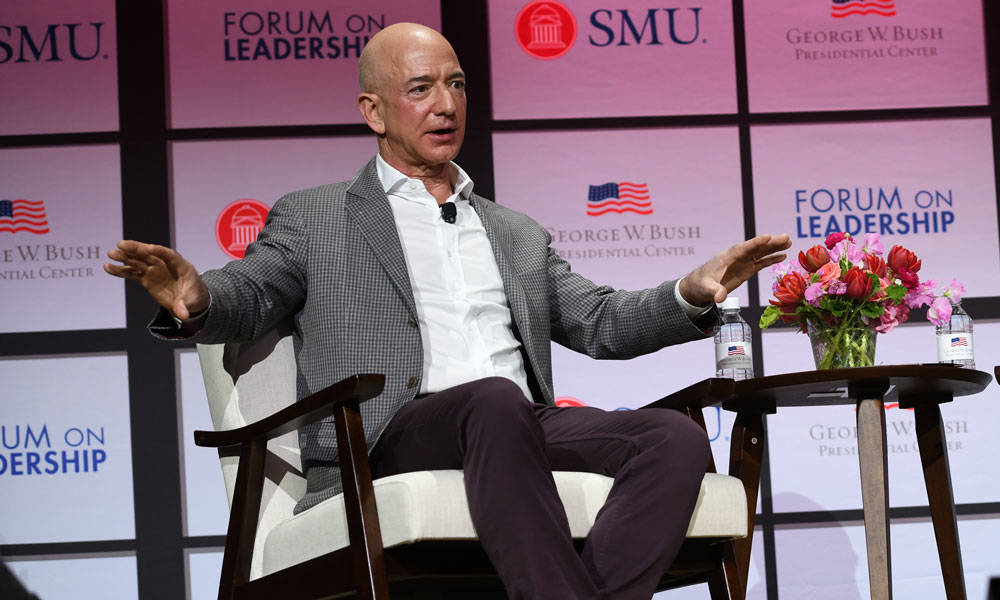
What Jeff Bezos’ Philanthropic Play Says About Big Giving Today
The Amazon founder is making his first major donation to causes he’s interested in, but the response to the announcement and the politics swirling around it show that even big donations can be seen through a critical eye.
The world’s richest man may be a bit late to the philanthropy game, but Jeff Bezos is starting out in a big way with a $2 billion fund that will help meet the needs of homeless Americans and fund a network of preschools in low-income communities.
Bezos, who is estimated to be worth $160 billion, took to Twitter on Thursday to announce the two-pronged Day One Fund. The Day 1 Families Fund will earmark money for nonprofits that provide food and shelter for homeless families. The Day 1 Academies Fund will launch an organization to operate full-scholarship Montesorri-style preschools, which it will run with “the same set of principles that have driven Amazon,” Bezos wrote. “Most important among those will be genuine, intense customer obsession.”
Bezos’ debut as a major philanthropist raises some interesting discussion points about the nature of philanthropy in 2018. Among them:
Philanthropy doesn’t shield the giver from criticism. Bezos’ announcement came a day after Business Insider reported on claims by Amazon delivery drivers that they feel pressured to drive dangerously and skip breaks and meals to meet delivery deadlines. Some who replied to Bezos’ tweeted plan were quick to highlight those issues and others about Amazon. Additionally, many critics noted that Bezos had not signed the Giving Pledge, an agreement among some of the richest people in the world to donate most of their wealth to philanthropic causes. Bezos’ decision not to donate more led some to wonder if the move was motivated by PR. “Whenever a massive fortune is used to do good, it can’t help but raise questions about how that fortune was made in the first place,” Slate’s Jordan Weissmann wrote.
Corporate interests may conflict with individual philanthropy, leading to mixed messages. Earlier this year, Amazon faced a major political challenge in its hometown of Seattle, when the city attempted to adopt a new tax on large companies, based on the number of people they employ, to help pay for homeless shelters and low-income housing. The legislation, which had passed the city council, was repealed after Amazon opposed it. Bezos expressed interest in addressing homelessness when he asked for public input into his philanthropic projects, citing the Seattle charity Mary’s Place, but the company’s fight against the tax bill sent a different message.
Major philanthropists are trending away from traditional foundations, though Bezos’ path isn’t clear yet. Bezos referred to Day One as a “fund” but didn’t make it clear whether it would be organized as a charitable foundation. (His parents already run the Bezos Family Foundation, which he has donated to in the past.) If he chooses not to organize the fund as a foundation, he would be joining a broader trend among major philanthropists. Laurene Powell Jobs, the widow of Apple cofounder Steve Jobs, has organized her Emerson Collective philanthropic effort as an LLC and has made nontraditional investments as a philanthropic organization, such as buying a majority stake in The Atlantic last year. Facebook founder Mark Zuckerberg and his wife, Priscilla Chan, did something similar with the Chan Zuckerberg Initiative. These initiatives give philanthropists more autonomy to donate and invest their money as they see fit, without the added scrutiny of public disclosure.
Every philanthropist has a unique style. Some major donors, like Bezos’ fellow Seattleite Bill Gates, promote their missions prominently and put a lot of effort into highlighting the work done under their name. Others, like Oracle Executive Chairman Larry Ellison, take a quieter approach. Bezos, by evoking the style of his company in his tweeted message, is expected to go in a different direction and may focus on issues close to home. In comments to USA Today, Amir Pasic, dean of the Lilly Family School of Philanthropy at Indiana University, noted that Bezos will likely cut his own path forward. “He’s not going to follow any pre-established routes on how he uses his fortune. It will be very interesting to watch,” Pasic said.
(Grant Miller for the George W. Bush Presidential Center/Flickr)






Comments